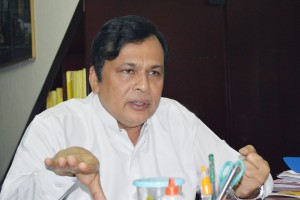News
Grade 5 exam harmful to children, adds pressure: Monitoring MP
View(s):Schoolchildren turning out to be metal mickeys due to high parental expectations and peer pressure
Monitoring MP for the Education Ministry and Ministry of Youth Affairs and Skills Development, Mohan Lal Grero believes that the Grade 5 scholarship exam is harmful for the children’s mind, as it adds pressure on them.
Mr Grero, in an interview with the Education Times, said that, “If the child is given the opportunity to read and explore the environment on his/her own, he/she will be able to perform even better during this examination.”
Excerpts of the interview;
Q: Your observations on the current education status in Sri Lanka.

Mohan Lal Grero
When we look at the education sector of our country, we can see that parents have high expectations for their children. Their attitude is such that they want to somehow or the other educate their children. Most parents, however, don’t know what education really is.
Education is not just intellectual development, but also physical, emotional, social and moral development. What we see in our country is that parents are interested in developing the intellectual aspect, especially where knowledge is concerned. This is again in streams such as Science, Maths and Language. They don’t realise that other areas are equally important. Ultimately, the child becomes more like a machine and is very competitive.
Q: Your observaions regarding Grade 1 admissions.
I think the competition to get into a leading school is very high. Out of the 9,700 odd schools, only about 56 schools are popular in Sri Lanka. Almost 25% of the parents whose children are entering Grade 1 are those who wish to admit their children to one of these 56 schools. But if there is a possibility of spreading these admissions to other schools, then they too could develop.
This is also the reason that private schools exist. Parents who fail to enrol their students into a leading State school, seek consolation in private schools. Sometimes there are better teachers in not-so-popular schools, but parents go behind the name.
Q: What other issues do you see in our education system?
The other area of concern is the Grade 5 scholarship exam. Again, to admit their students into a popular school, our parents push and pressurise their children to study even harder. The preparation for this exam starts as early as Grade 2. This is very harmful to our children’s inquiring mind. There is no space to freely explore their world around them and for creative activities. Thus the scope is limited to the Grade 5 exam, which also is specially in Science, Maths, IQ and Language areas.
As I see it, there is no space for the child’s brain to develop in this, as, from birth to their adolescence, students should be given the opportunity go about and experience the world. Their brains should be stimulated and then only the brain cells can grow. When the child is focused in doing just one thing, the brain doesn’t adopt other important areas such as creativeness. In short, because of the competition in the Grade 5 scholarship exam, our students’ childhood is being stolen from them. An exam oriented person will be produced in this manner.
I believe that if the child is given the opportunity to read and explore the environment on his or her own the student will be able to perform even better during this examination.
Q: How can an education system be successful?
There are three components that help to strive for a better education system. They are access to education, quality and equality, and relevance.
Education is a social process, and people of the country should be able to easily access education. That way, there is a universal access in Sri Lanka. We are ahead of many South Asian countries, with 99.6% of our primary school students completing their education.
In quality and equality we have a problem. Quality lies in the facilities, infrastructure and the teachers. Equality is the need for these resourses to be spread equally in our schools. But good teachers don’t like to go to rural areas, as the infrastructure facilities are poor. Thus equality and quality is less.
Relevance is whether what we teach is required for the jobs available. This is very important. We have to make students employable for them to be good citizens. There are many occupations that are equally powerful as being a doctor or a lawyer.
Q: How is the Government striving to address these shortcomings?
We have started the 1,000 secondary schools project. This is a process by which we will elevate our schools to the quality of a popular school. Each of these schools will be provided laboratories such as for IT, distance learning, Language and Maths, in addition to the Science laboratories, including new teachers.
Furthermore, each of these schools will be fed by five primary schools. Hence, students from these primary schools can enter this school after their Grade 5 exam, even if they pass or fail. Then the competition for Grade 1 admission and Grade 5 scholarship exam will be reduced. Then the introduction of the new Technology A/L stream will help students become more employable once they leave school and graduate from universities. Thus students who follow the Arts stream, as they have nothing else to do, can choose this stream as an alternative. Currently we have about 15,000 students following this stream.
We have started constructing 25 University Colleges and completed 10 of them, so that students who fail to get into the university, after their A/L Technical, can complete their higher education.
comments powered by Disqus
